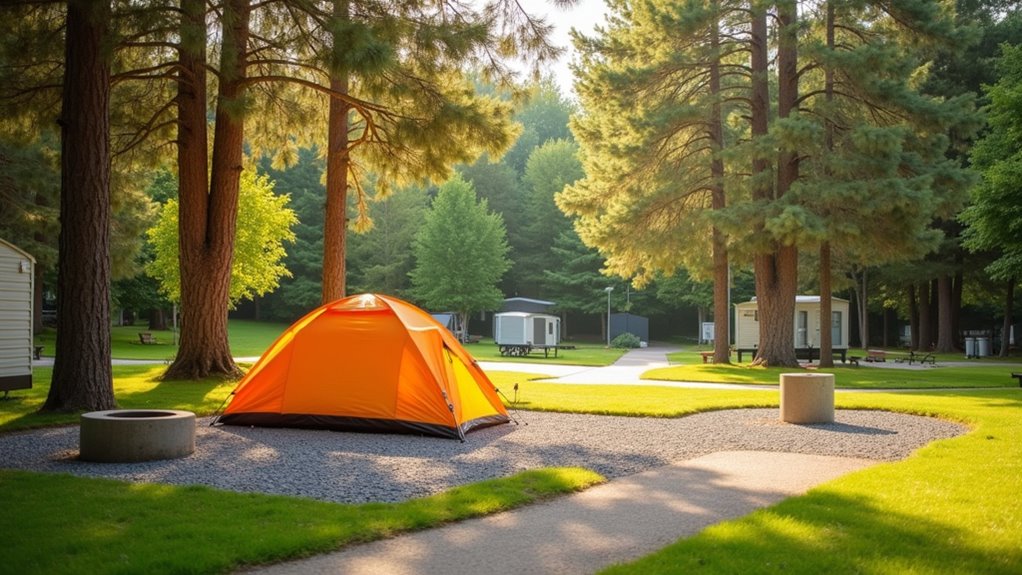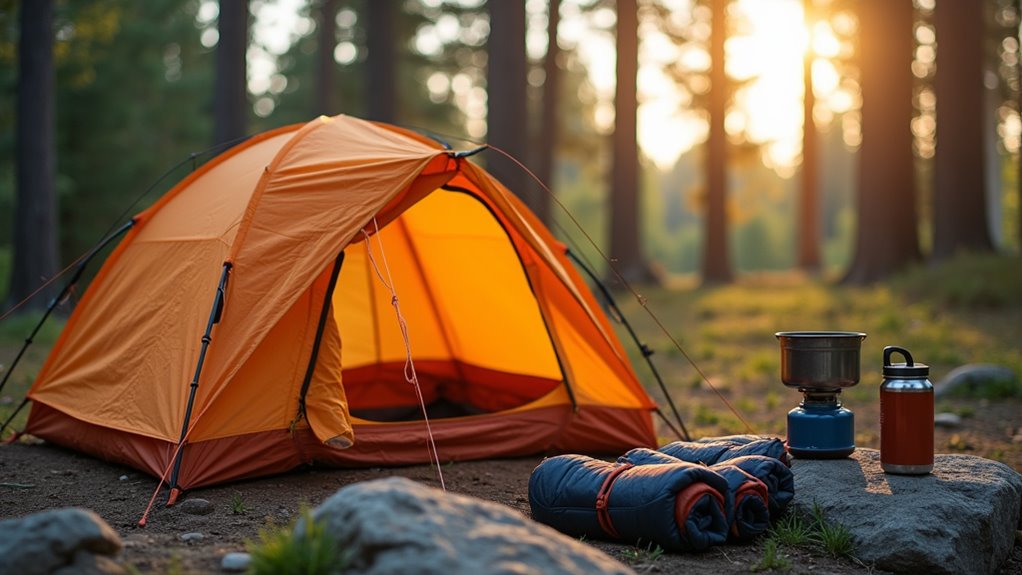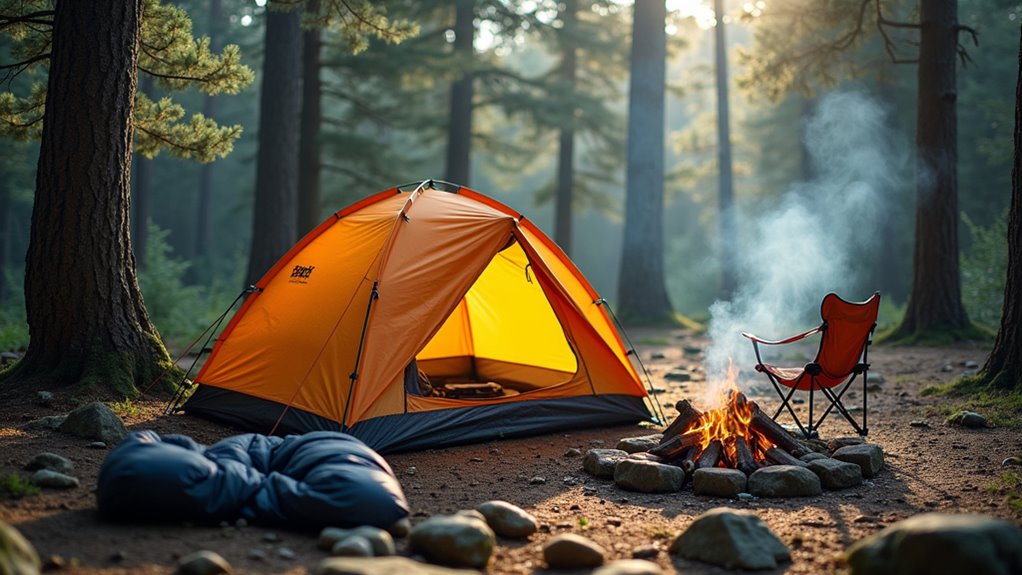Physical Address
304 North Cardinal St.
Dorchester Center, MA 02124
Physical Address
304 North Cardinal St.
Dorchester Center, MA 02124

Outdoor adventures await first-time campers, but one critical mistake could transform your dream getaway into a complete nightmare.
You’re probably wondering if you can actually pull off a camping trip without breaking the bank or making rookie mistakes that’ll ruin the whole experience. Here’s the thing: your first time outdoors doesn’t have to involve expensive gear or wilderness survival skills. With the right campground choice and a few essential items you might already own, you can create memories that’ll last a lifetime. But there’s one vital mistake most beginners make that could turn your adventure into a disaster.

Since your first camping experience can make or break your love for the outdoors, you’ll want to choose a campground that sets you up for success rather than frustration. Start with established campgrounds that offer restrooms, potable water, and fire pits. State parks often provide excellent beginner-friendly options at reasonable prices, typically ranging from $15-30 per night.
Look for campgrounds with level tent sites and nearby amenities like camp stores or visitor centers. Avoid primitive camping for your first trip – you’ll have plenty of time to rough it once you’ve mastered the basics.
Check online reviews and photos before booking, and consider reserving sites in advance during peak seasons. Choose locations within two hours of home, making it easier to retrieve forgotten items or head home if needed. Don’t forget to invest in quality gear like a recycled sleeping bag that will keep you comfortable throughout the night and enhance your overall camping experience.
While camping gear stores might convince you to buy everything in sight, you actually need far less equipment than you’d think to have a successful first trip. Start with the basics: a reliable tent, sleeping bag rated for expected temperatures, and a sleeping pad for comfort and insulation.
You’ll need a headlamp or flashlight with extra batteries, a first aid kit, and weather-appropriate clothing layers.
Pack a water bottle, basic cookware if you’re planning meals, and a cooler for food storage.
Don’t forget personal items like toiletries, sunscreen, and any medications. A multi-tool proves invaluable for various tasks.
Skip expensive gadgets for now. Focus on quality basics that’ll serve multiple trips rather than single-use items that’ll collect dust.
Remember that camping essentials can vary depending on your destination and season, so research your specific campground’s amenities and local weather conditions before finalizing your packing list.

Once you arrive at your campsite, take fifteen minutes to survey the area before unpacking anything. Look for level ground that’s free of rocks, roots, and low spots where water might collect. Avoid setting up directly under dead branches or in natural drainage areas.
Position your tent with the door facing away from prevailing winds. Clear away any sharp objects from your sleeping area.
Set up your kitchen station downwind from your tent but upwind from the fire pit if there’s one available.
Keep your food storage at least 200 feet from your sleeping area to avoid attracting wildlife. Organize your gear into designated zones: sleeping, cooking, and storage. This prevents you from constantly searching through bags.
Take photos of your setup for future reference. Plus, keep your vehicle accessible in case you experience a breakdown emergency and need to quickly access tools or contact help.
Before you strike your first match, check local fire restrictions and gather three types of wood: tinder (pencil-thin), kindling (thumb-thick), and fuel wood (wrist-thick).
Build your fire in existing fire rings or dig a shallow pit surrounded by rocks. Keep water nearby and never leave flames unattended.
For budget-friendly cooking, pack aluminum foil for easy cleanup. Wrap potatoes, vegetables, or seasoned meat in foil and place directly on coals. Hot dogs and marshmallows work great on simple sticks.
Cast iron pans distribute heat evenly but require seasoning afterward.
Always extinguish fires completely by dousing with water, stirring ashes, and checking for heat with your hand held safely above. Cold ashes mean you’re done.
For those seeking more adventurous camping destinations, consider exploring the majestic peaks and diverse landscapes of the Andes mountain range.

Even experienced campers face unexpected challenges, so don’t let minor setbacks ruin your first outdoor adventure. Weather changes quickly outdoors—pack rain gear and extra layers even if forecasts look perfect.
If your tent gets wet, prioritize ventilation to prevent condensation buildup.
Forgetting essential items happens to everyone. Befriend neighboring campers who often share supplies or offer helpful advice. Most camping communities are incredibly welcoming to newcomers.
Wildlife encounters are typically harmless if you store food properly in sealed containers or bear boxes. Never feed animals, as this creates dangerous dependencies.
Equipment failures teach valuable lessons. Bring duct tape for quick fixes and always pack backup essentials like flashlights and batteries.
Sleep discomfort is normal initially—consider bringing extra padding under your sleeping bag for better rest.
The key to handling these situations successfully lies in thorough preparation before you even leave home.
You’ll trade your comfortable bed for sleeping on the ground, your kitchen conveniences for a camp stove, and your bright house lights for flickering flames. Yet you’ll gain something priceless—stars you’ve never noticed, sounds you’ve never heard, and confidence you didn’t know you had. Your first camping trip won’t cost much, but it’ll teach you that sometimes the best experiences come from having less, not more.